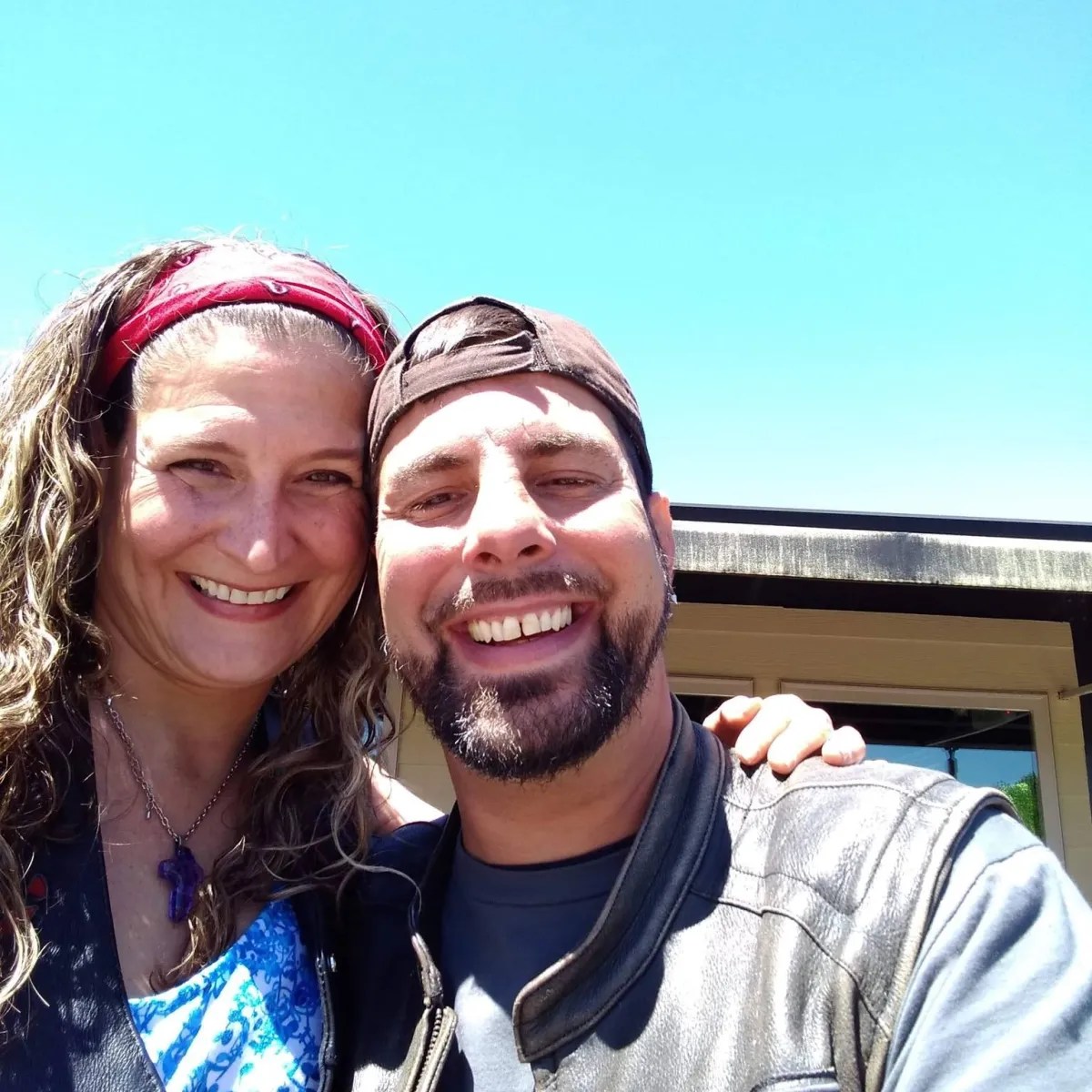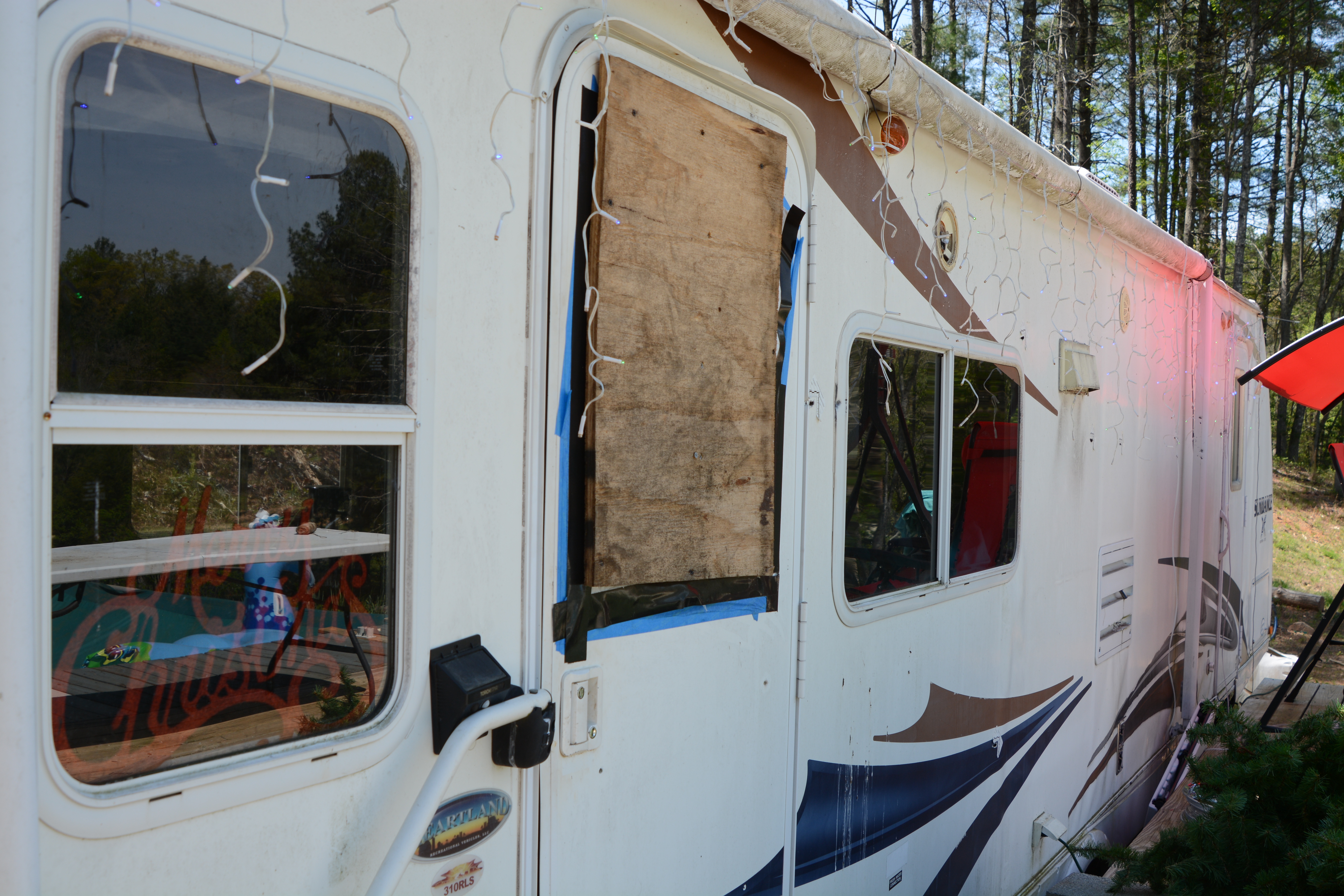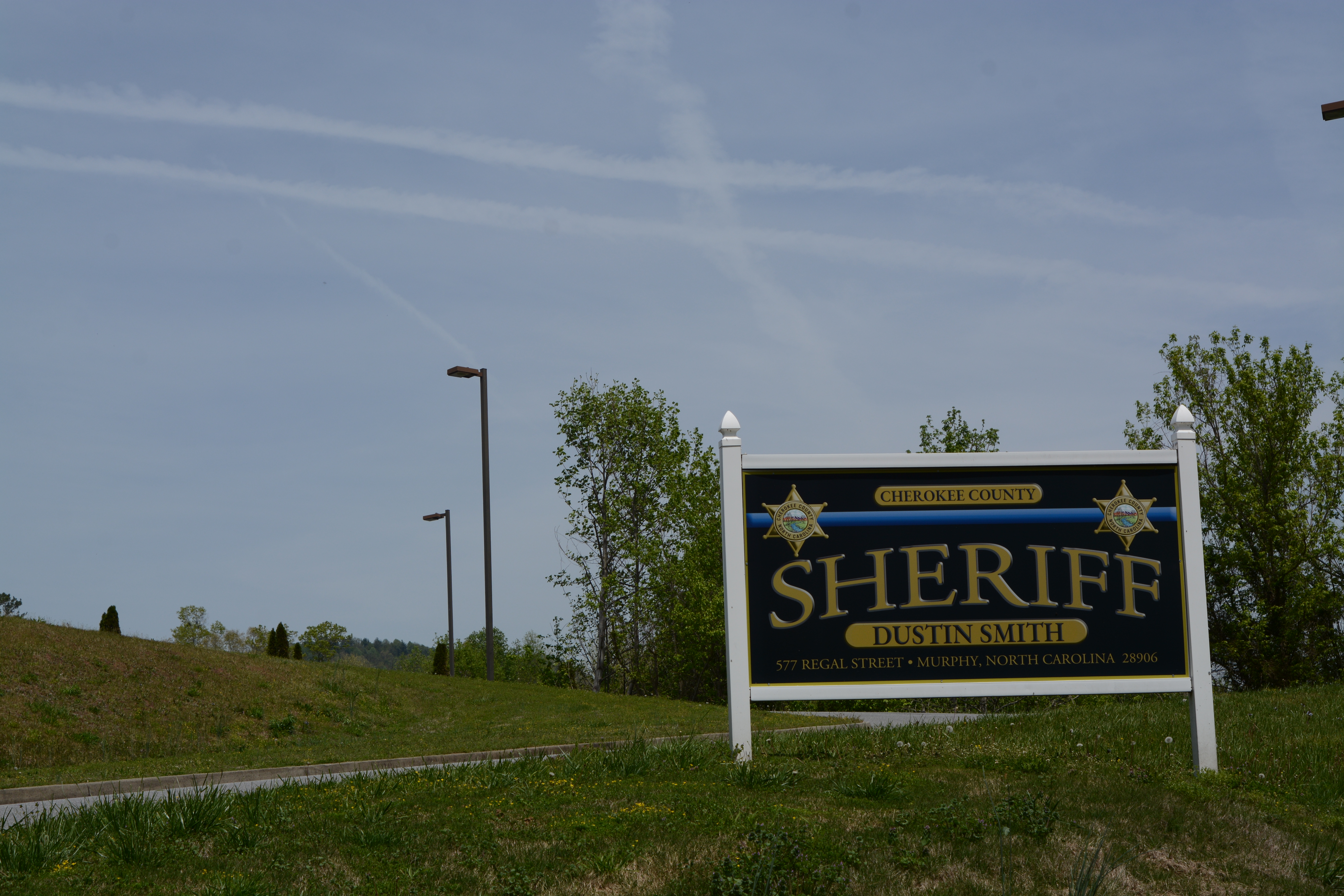|
Getting your Trinity Audio player ready...
|
Jason Harley Kloepfer woke up confused and disoriented on the morning of December 13, 2022. It was right before 5 a.m., still pitch black outside the camper trailer where he and his wife, Alison Mahler, lived in rural Cherokee County—and the front door had just swung open. He saw a light and grabbed his gun. The intruder, he soon realized, was a robot. But outside his home, a large number of people stood waiting.
“I heard them say they’re the police,” he said.
Kloepfer was puzzled, but not surprised. Though “nothing was registering” about why they were there that morning, a contentious relationship with his next-door neighbor meant the police had made regular visits to his home over the past few years, mostly to deal with complaints about noise and his love of celebratory fireworks. Kloepfer put his gun down—with the safety on, he said—and headed toward the door, lighting a cigarette on his way. These conversations usually lasted long enough to warrant a smoke.
“Step outside the door onto the deck and show us your hands,” an officer ordered through a loudspeaker. “Jason, we just want to talk to you. Come outside.”
Holding the lit cigarette in his left hand, Kloepfer swooped down with his right to grab the police robot as it crawled along the floor of his home. About half the size of a remote-controlled car, it scuttled along on two wheels, wielding a bright light and a camera that transmitted real-time footage to a screen outside. Kloepfer stumbled to the door with Mahler right behind him, opened it, and put his hands above his head.
“That split second I was able to see, I just remember thinking [of the movie] Armageddon,” he said. “And all of these bright spotlights, and then I seen silhouettes of people with guns.”
What happened next would change Kloepfer and Mahler’s lives forever—physically, emotionally, financially—and spur both a federal civil suit and a state criminal investigation that interrogate the line between legal and criminal for an on-duty officer, and what should happen when there’s reason to believe that line has been crossed.
Unbeknownst to the sleeping couple, the officers were supposedly surrounding their home out of concern for Mahler’s well-being. At 10:57 p.m. the night before, their neighbor had called 911 yet again to complain about the fireworks Kloepfer had been shooting off—but this time implying that Kloepfer may have hurt his wife. She said she’d heard Mahler scream “stop it,” followed by a “bunch of shots,” and then silence. According to the neighbor, Kloepfer had declared that he was “going to kill the whole neighborhood,” and said to “send the police, I’ll get them too.”
Three deputies were immediately dispatched to the scene—Sergeant Patrick Cody Williams, Sergeant Dennis Dore, and Deputy Adam Erickson—but they couldn’t find anybody to speak to there. That’s when they should have left, says a civil suit filed June 2023 in the U.S. District Court for the Western District of North Carolina, accusing the officers of “fabricat[ing] baseless stories of hostages and standoffs.”
The sheriff’s office dispatched four more officers and asked the Cherokee Indian Police Department to send over its SWAT team. By 4:54 a.m., Cherokee’s SWAT team and at least seven sheriff’s officers had surrounded the house.

Jason Harley Kloepfer and his wife, Alison Mahler. (Photo courtesy Kloepfer)
The officers sent a robot drone inside the camper, whose footage should have indicated there was no domestic dispute to address. Kloepfer’s home security video shows him and Mahler in bed together at the time, sleeping peacefully.
“The throng of 25 or so officers assembled in the yard has no basis to invade the home,” the suit claims.
But the officers commanded Kloepfer to come out with his hands up, and four seconds after he did, three tribal police officers—Nathan Messer, Neil Ferguson, and Chris Harris—fired about 15 bullets, two of which hit Kloepfer. One struck just above his elbow, blowing a tunnel through his arm, and another entered through his chest and lacerated his liver, cutting through his stomach and the lining of his heart.
The shots missed Mahler, but Kloepfer collapsed backward, repeating that he’d been shot even as the police continued to command him to “show us your hands.” He tried to comply, dragging himself to the door.
“When I was laying on that ground, I felt like my whole insides were laying out on that floor,” he said.
The officers later said they shot because they believed the police robot in Kloepfer’s right hand to be a gun.
Seventy-seven seconds after the shooting, officers swept the camper trailer. They grabbed Kloepfer by his left arm and dragged him “through dirt and rocks” out the door and down the ramp to the gravel driveway. After a request for a helicopter flight to Chattanooga’s Erlanger Medical Center was denied due to weather, Kloepfer was taken there via ambulance, a 75-mile drive. Kloepfer says he was awake for about two and a half hours before passing out.
“The throng of 25 or so officers assembled in the yard has no basis to invade the home,” the suit claims.
Kloepfer’s lawsuit
Mahler was not allowed to join her husband in the ambulance. Instead—she and Kloepfer contend in the lawsuit—the officers handcuffed her and took her to the sheriff’s office, where she was detained for about seven hours.
Kloepfer remained hospitalized for a week, waking up from his first round of surgeries to find 70 staples in his chest, 20 stitches in his arm, and a tube down his throat.
“[The doctors] said, ‘We have no explanation of why you’re alive right now,’” Kloepfer recalls.
Competing Narratives
The above narrative comes from Kloepfer’s home security video, his account of the events, court documents, and public records including radio traffic, 911 audio, and dispatch logs. But it’s a far different story than the one newly seated Cherokee County Sheriff Dustin Smith was telling hours after the shooting.
While Kloepfer was recovering from his near-death experience, Smith was approving a press release painting Kloepfer as the antagonist. According to this version of events, the officers fired after Kloepfer “engaged in a verbal altercation” with them, “emerged” from his home, and “confronted officers.” Once Kloepfer was discharged from the hospital, officers arrested him on two misdemeanor charges, communicating threats and resisting a public officer.
“The matter remains under investigation and more charges may follow,” the release said.
The civil suit alleges that sheriff’s deputies covered Kloepfer’s outdoor security cameras around 11:56 p.m., more than two hours before a search warrant had been issued. But Kloepfer also had interior cameras. He released his video on January 18, 2023, starting with the robot’s entrance to the trailer. If this footage hadn’t existed, Smith’s version of events likely would have gone undisputed.


The video ignited a firestorm within the Western North Carolina legal community and spurred Smith to backpedal on his previous statement. On January 20, he issued a new press release, this time blaming the Eastern Band of Cherokee Indians, whose SWAT team had been on the scene that night, for any false information in the original document. Neither he nor Chief Deputy Justin Jacobs was there during the shooting, Smith averred, so his department was reliant on information from the tribal police to inform its initial press release.
However, radio traffic from that night places Smith at the scene, and Kloepfer said Jacobs rode with him in the ambulance, something that the sheriff’s office respondents admitted in their response to the lawsuit. In their response, the tribal police defendants also admitted Kloepfer’s claim that both Smith and Jacobs were present. The sheriff’s office, meanwhile, claimed to “lack sufficient knowledge or information to form a belief as to the truth of the allegations” regarding the whereabouts of Smith and Jacobs. Dispatch records indicate that at least seven additional Cherokee County deputies and investigators were on the scene at the time.
The video convinced Ashley Welch, district attorney for the 43rd Prosecutorial District, to drop the charges against Kloepfer. Welch had filed the charges Smith’s office requested after officers described “a domestic hostage situation” in which Kloepfer “was armed and had been aggressive with law enforcement.” It sounded like “a pretty typical officer involved shooting,” she wrote in an email to the N.C. Administrative Office of the Courts on May 8, 2023.
But later, “evidence began to develop that this version of events was likely not accurate.” Welch expected this would factor into the ongoing State Bureau of Investigation probe into the shooting, and that investigators would interview her as “a necessary witness to possible felonious criminal activity by law enforcement.”
Therefore, she concluded, her office would not be able to handle any of the resulting legal fallout without creating an ethical conflict.
Conflict Counsel
When officers are involved in a shooting, the State Bureau of Investigation will typically investigate the incident and then pass its report to the local district attorney, who will determine whether criminal charges are warranted. With her status as a potential witness keeping her from filling that role, Welch began looking for another prosecutor to take on the case.
Her May 8 letter states that the N.C. Attorney General’s Office initially agreed to do so, but a few weeks later called back and “indicated that the higher ups at the Attorney General’s office had declined to take the case.” This is backed up through internal N.C. Department of Justice email exchanges The Assembly obtained.
“Evidence began to develop that this version of events was likely not accurate.”
District Attorney Ashley Welch
These emails show that on March 17, 2023, Section Head of Special Prosecutions and Law Enforcement Boz Zellinger told Welch the Department of Justice “would be happy to” handle Kloepfer’s case. But on March 31, Criminal Bureau Chief Leslie Cooley Dismukes wrote back to say she’d told Welch the department “doesn’t have the bandwidth to take this on right now,” citing the needs of a specific case they were already handling and the department’s new fentanyl control unit.
“She understood and will seek other conflict counsel,” Dismukes wrote.
In her May 8 letter, Welch said the DOJ had assured her it would still take the case if she wasn’t able to find another prosecutor’s office. She contacted the Conference of District Attorneys and another district attorney’s office, she wrote, but both declined. For the Conference of District Attorneys, this was “due to our caseload and other responsibilities at the time,” said Executive Director Kimberly Spahos. When Welch circled back to the AG’s Office, they said “they could not take the case due to ‘resources.’”

Ellis Boyle, who is representing Kloepfer in the civil case, sees the DOJ’s decision as political.
“What they meant was that the attorney general [Josh Stein] is running for governor and he doesn’t want to have more negative press beyond the ‘defund the police’ taglines against him,” he said. “So he would rather avoid the controversy and shirk his duty.”
Stein’s campaign did not return a request for comment for this story. In a response to Welch’s May 8 letter, sent May 12, 2023, and also obtained through a public records request, Stein’s deputy and general counsel Sarah Boyce thanked Welch for her letter and expanded on the capacity issues: “A critical member of our senior management team, who would ordinarily oversee a case like this one, is currently out on temporary leave … [W]e do have to consider our office’s capacity constraints. We have repeatedly asked the General Assembly to provide the Department with additional funding to hire more prosecutors.”
In a statement to The Assembly, Stein’s press secretary Nazneen Ahmed added that the department has only four special prosecutors able to take on cases from local district attorneys, each handling 10 to 15 cases at any given time. In 2023, the section closed 51 cases but ended the year with 69 active cases.
“As you can imagine, each of these cases is incredibly complex and requires significant time and resources from the prosecutors and support staff, such as paralegals … Unfortunately, we do occasionally need to decline a request to take on a case to ensure that the case gets the proper attention and focus on justice it deserves,” she said.
Jeffrey Welty, an expert in criminal law and procedure who is a professor of public law and government at the University of North Carolina Chapel Hill, said the path Kloepfer’s case followed is “probably not typical” but also not unheard of.
“There’s nothing inherently problematic or suspicious about that,” he said, “but I could understand how from the perspective of somebody who wants that case evaluated and addressed, the delay and uncertainty associated with multiple attempts to reassign it might not feel good.”
Ultimately, the case was assigned to retired assistant district attorney and Catawba County resident Lance Sigmon, whom the Conference of District Attorneys appointed as a special prosecutor.
Sigmon decided on December 18, 2023, about four months after being given the case, that none of the officers involved would face criminal charges, despite the “possible felonious criminal activity by law enforcement” that Welch saw in the evidence.

Spahos, who responded on Sigmon’s behalf to requests for comment, said Sigmon based his decision on “a variety of case law and legal precedent” after reviewing “the full investigation,” but declined to elaborate further on the reason for the decision.
Boyle called it “an absolute abomination and destruction of America and the legal system.” Attorneys representing the Cherokee County Sheriff’s Office, Eastern Band of Cherokee Indians, and the three shooters either declined or did not respond to a request for comment.
“They said, ‘Come out with your hands up,’ and he did, and they shot him,” Boyle said. “What did they do after that? They arrested her and they arrested him. They charged him with false crimes.”
Not only will the officers not face criminal charges, but they haven’t appeared to face professional consequences either. As of May 7, all but two of the 15 sheriff’s officers named in the civil suit still had their jobs. One of the two, Adam Erickson, was suspended and subsequently left the force in August 2023 following an unrelated arrest for DUI. Patrick Cody Williams left that June. J.T. Gray, who is named in the suit but departed the scene prior to the shooting, left his position in January 2023 but was rehired 11 months later. Under North Carolina law, the reason for an employee’s departure is not public record, but no suspension, demotion, or job title change preceded Gray’s or Williams’ departures.
A spokesperson for the N.C. Sheriffs’ Association declined to comment, saying it would be “inappropriate” to do so given that he did not have “first-hand knowledge of the situation.” Dallas McMillan, a retired corrections officer who serves as chairman of the Cherokee County Republican Party, with which Smith is affiliated, said the incident has not been a topic of discussion at party meetings he has attended.
“As a general part of our conservative principles in the Republican Party, we support strong and effective and professional law enforcement,” he said, adding that he believes Smith “is doing the best job he can.” “I have full faith when it goes through the court system that the correct process will be followed and the correct outcome will happen.”

The three tribal officers who fired at Kloepfer are still on the force, said the tribe’s Attorney General Mike McConnell, though he declined to provide the employment status of the remaining nine tribal officers named in the suit. North Carolina public records laws don’t apply to tribal governments.
Boyle believes there is another potential avenue for accountability. He said he spoke with federal Bureau of Indian Affairs agents who conducted what he understood to be a noncriminal investigation into the use of excessive force. McConnell declined to provide a copy of that report, confirm or deny its existence, or say whether there was any finding of fault against the three officers. The Assembly has filed a Freedom of Information Act request for any such report.
Though angry at the decision, Boyle said he’s “not surprised at all,” that the cops won’t face criminal charges. “This is what they do,” he said. “This is why we have to have a civil justice system.”
‘The Money is Secondary’
The civil case, which Kloepfer and Mahler filed in June 2023, seeks millions of dollars in damages, alleging that the officers’ actions that night amounted to attempted murder.
Initially, the lawsuit named 31 defendants facing about 400 claims between them spread over 25 counts; a ruling last December cut the list to 29 defendants and about 200 claims. But a trial isn’t expected until August 2025 at the earliest.
Winning in the civil case is “just everything,” Kloepfer said. Before the shooting, he and Mahler were enjoying life, with six figures in the bank; now, they’re six figures in debt and “so lost in this world.” Still, “the money is secondary,” he said. He wants to go to trial, to put all the evidence out there in the open, hoping that it will cause such a big outcry the justice system will be forced to reconsider charging the officers involved.
“They said, ‘Come out with your hands up,’ and he did, and they shot him.”
Ellis Boyle, Kloepfer’s lawyer in the civil case
“We’ll spend millions if we have to, hiring investigative teams to go after them still and to hold everybody accountable and do what we got to do to make sure we get justice, because that’s what matters,” he said. “You’re not going to come and try to kill me and my wife and get away with it, just paying us. Sorry. Payment doesn’t excuse you trying to kill us.”
Prosecuting a law enforcement officer is a difficult thing to do, and getting a conviction is even harder. That the men who fired at him were tribal officers operating on non-tribal land at the request of the local sheriff adds another twist to the case.
It’s unclear whether sovereign immunity protections that typically apply to tribal governments could impact the outcome. As The Smoky Mountains News previously reported, the civil suit now working its way through federal court could be a case of first impression on this question.

“Policing is a dangerous job, and it requires officers to make quick decisions in sometimes uncertain circumstances,” Welty said. “That shouldn’t immunize officers from any accountability, but it is something that prosecutors, I think, try to keep in mind when assessing whether criminal charges are warranted.”
Welty named two major determinations prosecutors must make when deciding whether to press charges. First, they must be able to prove criminal intent, often a “big hurdle.”
Second, prosecutors know that “there’s no point in charging somebody if there’s no realistic chance of securing a conviction,” he said. They have to know about the community and the potential jury pool to understand whether the case is even viable. There are times when a prosecutor might think they have probable cause to support a criminal charge, but doesn’t believe a jury will find guilt beyond a reasonable doubt. In those cases, the prosecutor might decide that pursuing the case is not a good use of resources.
More pragmatic considerations may sometimes play a role, too, because “999 times out of 1,000, it’s cops arresting bad guys and prosecuting them,” Boyle said, “and the DAs, the prosecutors, are doing the righteous will of the people.”
“I think it’s very difficult for a prosecutor to be able to do their job in the future if they prosecute a law enforcement officer,” Boyle said.
Kloepfer and Mahler want their day in court so they can tell the world what happened that night—and, hopefully, win a settlement big enough to leave behind the hand-to-mouth life they’ve been living since the shooting.
They no longer reside at their property in Cherokee County, convinced the police will return to finish them off. Instead, they’re draining their savings to pay rent for an apartment in their native Long Island, New York.
But no amount of money will erase the trauma of being nearly shot to death.
“I have to look at my scars every day,” Kloepfer said. “I can’t escape it.”
Holly Kays was previously a reporter for The Smoky Mountain News. She is the author of two books, most recently Trailblazers and Traditionalists: Modern-day Smoky Mountain People, a collection of 33 pieces profiling the diverse people who call the Smoky Mountain region home.


